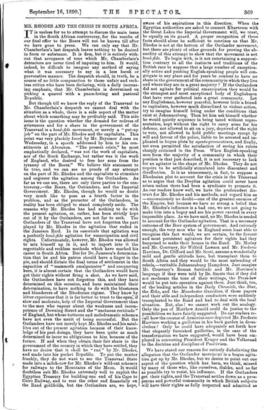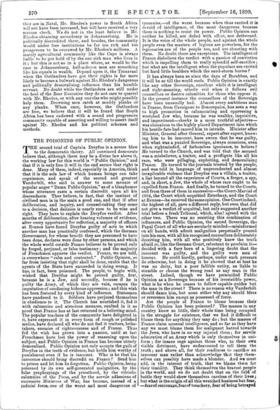MR.. RHODES AND THE CRISIS IN SOUTH AFRICA.
TT is useless for us to attempt to discuss the main issue in the South African controversy, for the results of our final offer to the Boers will not be known till after we have gone to press. We can only say that Mr. Chamberlain's last despatch leaves nothing to be desired in form or substance. It is firm, but it is entirely with- out that arrogance of tone which Mr. Chamberlain's detractors are never tired of imputing to him. It would, indeed, be difficult to imagine any method of saying what it was necessary to say in a less harsh or provocative manner. The despatch should, in truth, be a source of no little compunction to those unfair and reck- less critics who have been declaring, with a daily increas- ing emphasis, that Mr. Chamberlain is determined on picking a quarrel with a peace-loving and pastoral Republic.
But though till we know the reply of the Transvaal to Mr. Chamberlain's despatch we cannot deal with the situation as a whole, there is a side aspect of the matter about which something may be profitably said. This side issue is the question whether the demand for redress of grievances and for a share in the government of the Transvaal is a bond fide movement, or merely a " put-up job" on the part of Mr. Rhodes and the capitalists. This point was very pluckily faced by Mr. Brynmor Jones on Wednesday, in a speech addressed by him to his con- stituents at Aberavon. " The present crisis," he most emphatically declared, " was not the work of capitalists, nor of the Stock Exchange, but rather was it the work of England, who desired to free her sons from the tyranny of the Boers." We believe this statement to be true, and we can see no proofs of any attempt on the part of Mr. Rhodes and the capitalists to stimulate and engineer the agitation among the Outlanders. As far as we can see, there are only three parties to the con- troversy,—the Boers, the Outlanders, and the Imperial Government. Mr. Rhodes, though he would no doubt very much like to pose as a fourth factor in the problem, and as the protector of the Outlanders, in reality has been obliged to stand completely aside. The reasons why Mr. Rhodes has had nothing to do with the present agitation, or, rather, has been strictly kept out of it by the Outlanders, are not far to seek. The Outlanders of the Transvaal have not forgotten the part played by Mr. Rhodes in the agitation that ended in the. Jameson Raid. In its essentials that agitation was a perfectly bona file agitation for emancipation and civil rights. Unfortunately, however, Mr. Rhodes was allowed to mix himself up in it, and to import into it the regrettable and reckless methods which have marked his career in South Africa. But for Dr. Jameson's determina- tion that he and his patron should have a finger in the pie, and should dictate the final terms of settlement in the capacities of " mammoth amalgamator " and conquering hero, it is almost certain that the Outlanders would have got their rights without firing a shot. As we have said, the Outlanders have not forgotten this, and they have determined on this occasion, and have maintained their determination, to have nothing to do with the blusterers and blunderers of the Rhodesian regime. They know by bitter experience that it is far better to trust to the open; if slow and moderate, help of the Imperial Government than to the men who vapour about the weakness and incom- petence of Downing Street and the "unctuous rectitude" of England, but whose tortuous and melodramatic schemes have not even the merit of being successful. But the Outlanders have not merely kept Mr. Rhodes and his satel- lites out of the present agitation because of their know- ledge of his past doings, they have been quite as much determined to incur no obligations to him because of the future: If and when they obtain their fair share in the government of the country in which they have settled, they have no desire that it shall be "run " by Mr. Rhodes, and made into his pocket Republic.. To put the matter frankly, they do not want to see the Transvaal State made into a milch-cow for Mr. Rhodes's wild-cat schemes for railways to the Mountains of the Moon. It would doubtless suit Mr. Rhodes extremely well to exploit the Egyptian Treasury for building one end of his Cape to Cairo Railway, and to rest the other end financially on the Rand goldfields, but the -Outlanders are, we hope, aware of his aspirations in this direction. When the Egyptian authorities are asked to connect Khartoum with the Great Lakes the Imperial Government will, we trust, be equally on its guard. A proper recognition of these facts should alone be sufficient to convince its that Mr.
Rhodes is not at the bottom of the Outlander movement, but there are plenty of other grounds for proving the ab- surdity of this attempt to show that the movement is not bond fide. To begin with, is it not entertaining a supposi- tion contrary to all the instincts and traditions of the British race to suppose that a large number of exception. ally active and pushing English-speaking people will con- gregate in any place and for years be content to have no share in the government of the community in which they live and where they are in a great majority ? If the Outlanders did not agitate for political emancipation they would be the strangest and most exceptional body of Englishmen that have ever gathered into a great community. Let any Englishman, however peaceful, however little a friend to capitalists, however much disinclined to violent action, try to imagine himself living under the conditions that exist at Johannesburg. Then let him ask himself whether he would quietly acquiesce in being taxed without repre- sentation, kept without the right . to carry arms for his defence, not allowed to sit on a jury, deprived of the right to vote, not allowed to hold public meetings except by will and favour of the police, liable to be arrested and im- plicated in bogus plots by agents-provocateurs, and finally, not even permitted the satisfaction of seeing his rulers sharply criticised in the Press. When English-speaking men form the majority of a community in which their position is that just described, it is not necessary to look for an agitator in the shape of Mr. Rhodes. They do not require to be artificially stimulated into discontent and disaffection. It is as unnecessary, in fact, to suppose a, Rhodesian plot to account for the crisis in the Transvaal as to argue that the Dreyfus agitation could never have arisen unless there had been a syndicate to promote it. As. our readers know well, we have the profoundest dis- trust for Mr. Rhodes and his methods, and regard him as —unconsciously no doubt—one of the greatest enemies of the Empire, but because we have so strong a belief that Mr. Rhodes's influence is a bad one, we are not going to make bim into a bogey and see his power exerted in every impossible place. As we have said, no Mr. Rhodes is needed to account for the Outlander agitation. That is a necessary outcome of the Boer system of government. And curiously enough, the very men who in England seem least able to recognise this fact would, we are certain, be the fiercest and most persistent agitators for their rights had they happened to make their homes in the Rand. Mr. Morley and Mr. Courtney, Sir Wilfrid Lawson and Mr. Frederic Harrison, Dr. Clifford and Mr. Scott, assume a wonderfully mild and gentle attitude here, but transplant them to South Africa and they would be the most unbending of rebels,—veritable Johannesburg Hampdens. Just imagine Mr. Courtney's Roman fortitude and Mr. Harrison's language if they were told by Dr. Smuts that if they did not moderate the tone of their writings, the Press-law would be put into operation against them. Just think, too, of the leading articles in the Daily Chronicle, the Star, the Echo, and the Manchester Guardian, if those papers and their able and independent conductors were suddenly transplanted to the Rand and had to deal with the local situation. But, alas I we cannot work out the analogy. Only the pen of Matthew Arnold could do justice to the possibilities we have faintly suggested. Do our readers re- call how the creator of Arminius once depicted Mr. Frederic Harrison working a guillotine in his back garden in dress- clothes ! Only he could have adequately set forth how that elegantly furnished guillotine, in the case of the transformation we have suggested, would have been em- ployed in converting President Kruger and the Volksraad to the doctrine and discipline of Positivism.
We have stated our reasons for entirely disbelieving the allegation that the Outlander movement is a bogus agita- tion got up by Mr. Rhodes, but we desire to point out one aspect of the question which has been, we think, missed by many of those who, like ourselves, dislike, and as far as possible try to resist, his influence. If the Outlanders get, their rights, and the Transvaal settles down as a pros- perous and powerful community in which British subjects will have their rights as fully respected and admitted as they are in Natal, Mr. Rhodes's power in South Africa will not have been increased, but will have received a very serious check. We do not in the least believe in Mr. Rhodes obtaining ascendency in Johannesburg. He is politically discredited there, and besides, the community would under free institutions he far too rich and too prosperous to be overawed by Mr. Rhodes's millions. A mainly agricultural community like the Cape is always liable to be got hold of by the one rich man who lives in it ; but this is not so in a place where, as would be the case in Johannesburg, half-a•dozen men are something like his equals in wealth. Depend upon it, the Transvaal when the Outlanders have got their rights is far more likely to become a bulwark against Mr. Rhodes's dangerous and politically demoralising influence than his humble servant. No doubt while the Outlanders are still under the heel of the Boer Executive they do not care to quarrel with Mr. Rhodes, or with any one else who might possibly help them. Drowning men catch at muddy planks or any planks. When once, however, the Outlanders are free, we believe that it will be found that South Africa has been endowed with a sound and progressive community capable of asserting and willing to assert itself against Mr. Rhodes and his political schemes and methods.



































 Previous page
Previous page